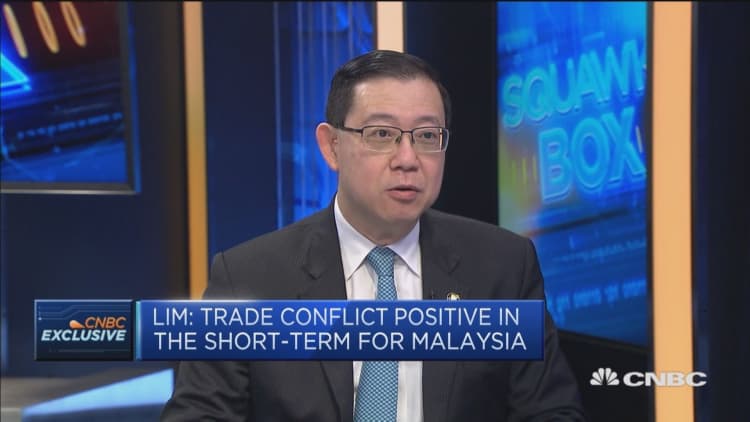
Malaysia should take "take advantage" of the opportunities arising from escalating trade tensions between the U.S. and China, Malaysian Finance Minister Lim Guan Eng told CNBC on Thursday.
The Malaysian economy has been "influenced" by the ongoing trade war between Washington and Beijing, he said, but that could actually be "positive" for the country in the short run despite the outlook appearing "a bit uncertain," Lim said.
There have been many inquiries from those "who wish to be in the right position" if the trade war escalates, he said.
"Our problem at the moment, with our manufacturing industries, is a problem of capacity — whether we can ramp up capacity in the shortest possible time," Lim said. "There's a lot of inquiries, not only from China but also from United States."
"We should try to take advantage (of the situation) whilst we can," he added.
But he acknowledged that "in the long term, we hope the trade war would fizzle out because it's not good for the global economy and what's not good for the global economy is not good for Malaysia in the long term."
Lim said he supported global trade, "especially if it is fair."
New government's priorities
Malaysia's new government under Prime Minister Mahathir Mohamad has said it was saddled with a debt of about 1 trillion ringgit — more than $241 billion — from the previous administration.
The country is also recovering from a multibillion dollar financial scandal surrounding state investment vehicle 1Malaysia Development Berhad (1MDB).
"We have to go through the legal process and due process takes a long time, but we are getting there," Lim said, commenting on the current progress of recovering the missing funds from 1MDB.
Another focus of the new administration has been to reexamine international deals struck by the previous government, with Mahathir traveling to China in August to renegotiate some of the deals backed by Beijing.
Emphasizing that Malaysia is supportive of China's Belt and Road Initiative, a continent-spanning investment program meant to increase Beijing's economic and geopolitical clout, Lim said his country wants a "fair deal."
"We do not want any unfair contracts and we feel that some of these contracts entered into by the previous regime (were) unfair to the country and not in our national interest," he said.
Beyond China, Lim said Malaysia has been in "close contact" with other countries such as Japan and the U.S., stressing the need for his nation to build "mutually beneficial relations."
"We do not want to enter into any deals or any contracts that would cost us to be in heavy debt. We do not want to cede or give up our sovereignty just because we are unable to pay off these debts," he added.
"We are supportive of global trade, especially if it is fair trade," Lim said. "If it's not fair trade, then why should we be part of the deal?"
Lim himself is no stranger to controversy. He was recently acquitted of corruption charges from a 2016 case involving the purchase of a bungalow in Penang state where he formerly served as chief minister. He had pleaded not guilty to both charges, saying they were "politically motivated."
— Reuters contributed to this report.


